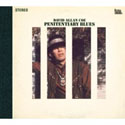
David Allan Coe
Penitentiary Blues
Shout! Factory
Penitentiary Blues is on a whole different planet from most country music. Perhaps one of the “realest,” if not most dangerous, country albums ever made –yeah, I’m talking in the gangsta and punk rock and black metal senses of the word– it’s a billion miles removed from Nashville and the red-stater, family-friendly pablum spouted by modern country softies. It eschews the twang and grit of country and uses the darker side of that other distinctly American musical form, the blues, to tell these vengeful and bleak tales. This is the same eerie vein of blues practiced by those who seem to have a hell-hound on their trail as well (just without the badge) –the Cramps, Hasil Adkins, RL Burnside, Screamin’ Jay Hawkins, early Muddy Waters– tortured, raging fits of self-mutilation and defiant brawling, backed up by lo-fi 12-bar guitar, organ and a rhythm section beating coffins. Bonafide hellraiser Coe penned this album while serving his eighth consecutive term in prison back in 1968. And in the years following his release, Coe would become the herald of outlaw country, meaning it maaaaaaan, both aesthetically and in terms of a (disordered) lifestyle –but also becoming a hot-shit songwriter along the way, penning hits for the likes of Johnny Paycheck and Tanya Tucker. The songs on Penitentiary Blues lack any hints of “hit” (and I don’t mean that in a pejorative sense at all; this album is godhead), and you certainly can’t imagine any other voice swaggering up to the microphone and delivering lines bemoaning cold turkey and drug tests in prison with such impunity.
The recording is dense, lo-fi and intimate, sounding like the band is throwing down at the roadhouse on the edge of town, the last joint that will even tolerate Coe and his band of villains –and they’re THIS close to being thrown out, just on general principle. There’s a slight crackle and ambiance to the record which really makes it feel as if you’re experiencing something from before a time when country, and music in general, became too gentrified. The piano is barreling and roadhouse, two-fisted; the rhythm section is super-fucking tight, with the drummer especially capable of full-on rockabilly stomp or lightly brushed regret/melancholy; the guitar is superb, teardrops of bruised silver or wire-tight rockin’ tension, almost punk-like in terms of punch and Coe’s voice – man, he sounds so young then, even though he’d lived so much and his voice is capable of moments of unvarnished beauty (the gothic grandeur of “Funeral Parlor Blues.”) There’s still a smoothness to be found unless he starts spewing blood-and-thunder parables of damnation without redemption, up there with Johnny Cash in terms of audio verite and presence (like “Cell #33”). Elsewhere there are laments about the roughness of prison life and missing his fast life on the outside, odes to ultra-cheap Mogen-David wine, spitting in the eye of authority and drug-fueled, tear-stained goodbyes to a dead love.
The packaging is faithfully reproduced by the good people at Shout! Factory, also known for their peerless DVD issues of the TV series Home Movies. It’s a foldout digipak, wherein the front cover actually forms a set of prison bars that obscure the cover photo of a squint-eyed, disreputable and hard-bitten Coe. The original art and liner notes are preserved (loved the tour bus photo), but then exponentially expanded with an historical essay penned by country scholar Colin Escott and a fascinating zine-like essay written by Coe titled, “How to Pull Time and Parole,” an objective and strident guide to getting by in the slammer and afterward. There are no sarcasm or games here; Coe writes to educate. Included in the album artwork is a collage by Coe and a handwritten note by the man, looking back in wonder at his very first album. So should we all. Mercury this wild doesn’t often come around.
Shout! Factory: http://www.shoutfactory.com












